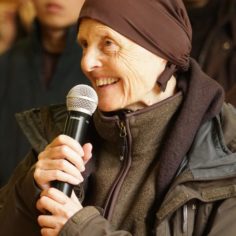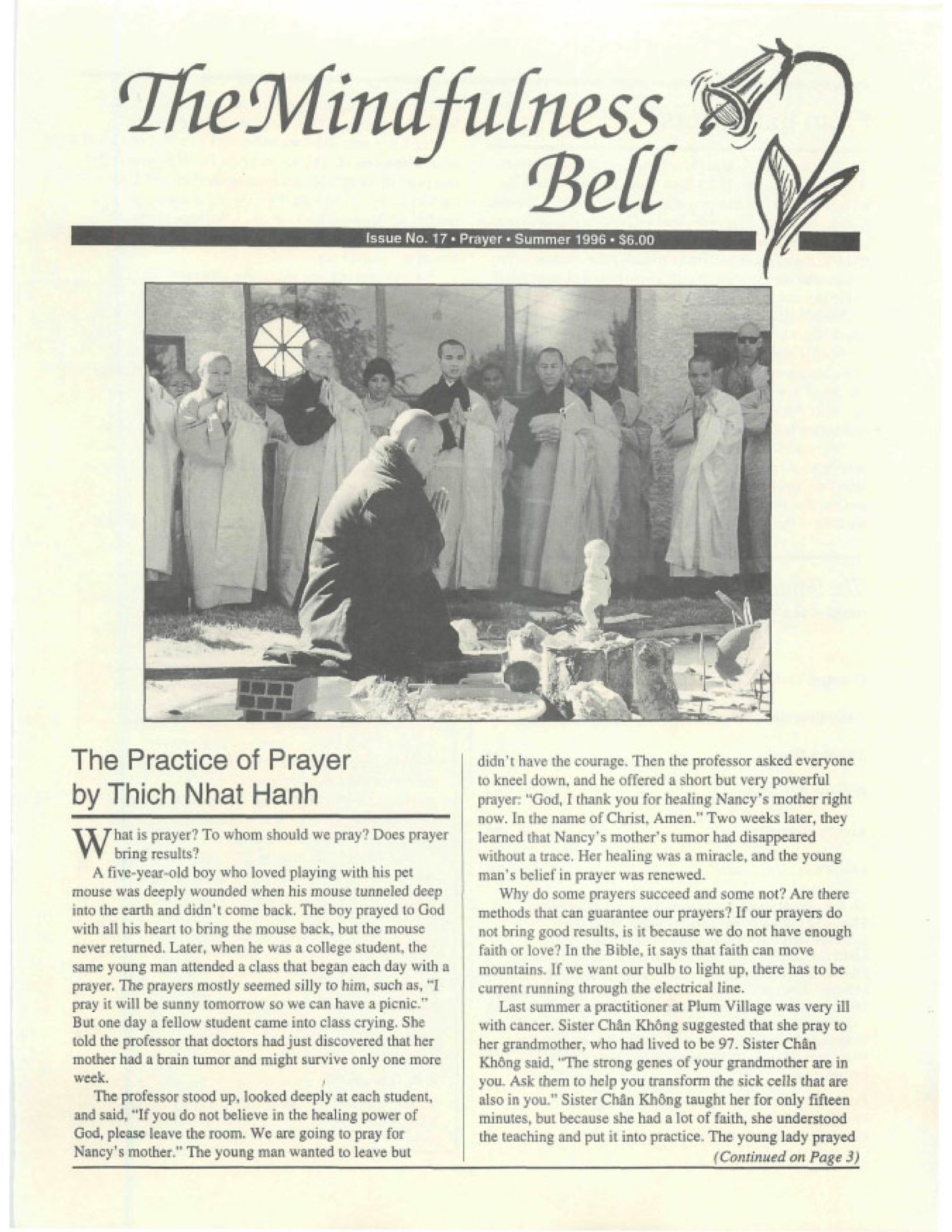By Sister Annabel Laity in June 1996
Sister Tue Nghiem and I visited Thailand in March, the hottest month of the year there. Apart from enjoying a wonderful selection of tropical fruits and mango with sticky rice, we led retreats and gave Dharma talks.
The young people were those most interested in the teachings of Master Thich Nhat Hanh. It is wonderful for us from the West to be in a country whose roots are Buddhist and to learn from that tradition.
By Sister Annabel Laity in June 1996
Sister Tue Nghiem and I visited Thailand in March, the hottest month of the year there. Apart from enjoying a wonderful selection of tropical fruits and mango with sticky rice, we led retreats and gave Dharma talks.
The young people were those most interested in the teachings of Master Thich Nhat Hanh. It is wonderful for us from the West to be in a country whose roots are Buddhist and to learn from that tradition. On the other hand, traditional Buddhism can be molded in forms which are no longer suitable. Buddhism, like everything else, needs constant renewal: building on the old but giving it new, appropriate forms. We were very happy to see the commitment to renewing Buddhism in some monks. They were willing to sing Dharma songs with us and participate in a meditation guided by a Thai artist. Whenever either of the sisters gave teachings, they listened most attentively.
We stayed with Thai nuns, who are called mae chi (reverend mothers). These nuns are not allowed by the government to receive the ten novice precepts or the bhikshuni precepts. Instead, they practice the eight precepts which include celibacy, not eating after noon, and not having luxury items. Officially however, they are seen as laypeople. There is a movement to have the novice-precept ordination for women made legal, and it is supported by many young people, especially young men. Some mae chi organize themselves in communities and do social work especially with prostitutes, those who have been raped, and single mothers.
Parts of Thailand have become devastated by deforestation and over-cultivation. Monks, nuns, and committed lay practitioners are trying to reforest these barren lands. We visited one center being created by city architects to renew the old Thai traditions. They have many baby plants and trees prepared to make green, fresh, and cool again a place which feels like a desert.
The laypeople are devoted to serving the monks and, in some cases, the nuns. They rise early in the morning to cook and offer food to monks, who make the almsround before six o'clock. The laypeople, as in any culture where Western habits are starting to take root, are subject to much stress and need a practice they can incorporate into their daily lives. Those who work in the field of social action often suffer from burnout. We know that the teachings of Master Thich Nhat Hanh are a wonderful remedy for them. So we hope you will all support a renewal of Buddhism in Thailand and that in a few years, we shall see real shramanerika (novice nuns) practicing in all parts of Thailand. The time seems ripe.
Sister Annabel Laity, True Virtue, is a Dharma teacher and the Head of Practice at Plum Village.
Excerpt from interview in The Bangkok Post
BP: In Thailand, we believe that the bhikshuni lineage is long broken. How, then, were you ordained?
Sr. A: The bhikshuni lineage was never broken. The daughter of King Asoka was ordained a bhikshuni in India and then established the lineage in Sri Lanka. In the 5th century, 12 bhikshunis from Sri Lanka went to China and established the bhikshuni order there. Some nuns from Vietnam were ordained in China very soon after, and took the lineage back to Vietnam. I was ordained in Vietnam, into the same bhikshuni that dates back to Buddha's times. China, Vietnam, Korea, and Taiwan still observe the bhikshuni tradition.... If society realizes the value of bhikshuni, they will make an effort to bring them back one way or the other. There are also old feelings that women are obstacles to monks' spiritual liberation. But if monks are strong, then women are no problem for them. Like anger, sexual desire comes from the seeds within you. Sexual desire comes from monks, not from women. To make the bhikshuni possible, it is necessary for society to realize first that women are equally capable of meditation and teaching Dharma.... Lay women need bhikshuni because women need women role models. They did in Buddha's time.... Why not in Thailand?
BP: How do you feel being relegated to a lower status than monks while here in Thailand?
Sr. A: Buddha teaches us to be aware of how society works. In Asia, women are in second place. While here, I'm happy to conform, to prostrate to the monks. It is only an outer form. If we don't conform, people will be shocked and they won't come to listen and learn from Dharma talks. If monks want me to bow, I can accept that. The people bowing and bowed to are the same in nature. Both are empty. While bowing, I meditate: I'm empty and you're empty too. Empty means being made up of everything else but not you. But if they say women cannot meditate or be Dharma teachers, that I cannot accept. Monks here respect me as a Dharma teacher, and I'm happy with that....
BP: What have you learned from Buddhism in Thailand?
Sr. A: The monks' simplicity of life and their freedom. This learning is very important, especially for Buddhists in the West. We have no Buddhist roots, and then have to take the best from each school to build our own Western Buddhism. We must take what is most applicable to our situations while remaining true to the spirit of simplicity. Buddhism adapts to the countries it goes to.... The important thing is to keep the essence, which is what we need so much in Western society.


